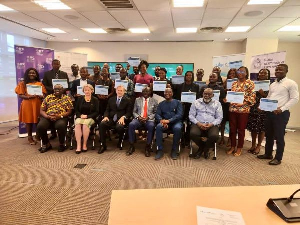 IFC, GhIS trains youth on green building drive
IFC, GhIS trains youth on green building drive
As the construction industry faces mounting pressure to reduce its environmental footprint, Ghana is taking decisive steps to promote sustainable building practices.
The sector, responsible for roughly 40% of global carbon emissions plays a critical role in the global effort to combat climate change particularly in rapidly urbanizing countries like Ghana.
To address this challenge, the International Finance Corporation (IFC), in partnership with the Ghana Institution of Surveyors (GhIS) and supported by Switzerland’s State Secretariat for Economic Affairs (SECO), spearheaded a capacity-building initiative aimed at embedding sustainability into Ghana’s construction landscape.
Central to the initiative is the IFC’s EDGE (Excellence in Design for Greater Efficiencies) Green Building Certification Programme, which trains built environment professionals in cost-effective methods to reduce energy use, water consumption, and carbon emissions in construction.
By equipping architects, surveyors, and educators with data-driven tools and sustainability principles, the programme is creating a new generation of climate-conscious professionals.
Speaking at the event, the IFC Senior Country Manager Kyle Kelhofer noted the programme’s expanding reach.
He stated that over 200 students in Ghana have now completed the course and that more than 30 lecturers from five universities have been trained to incorporate EDGE principles into their teaching.
“Over 200 students in Ghana have now completed the course, and more than 30 lecturers from five universities have been trained to integrate EDGE into their teaching,” he said.
This two-pronged approach—targeting both industry professionals and academic institutions—is seen as essential to sustaining long-term change in the sector.
Local advocates of the initiative also their voiced support to the course.
The President of the Ghana Institution of Surveyors, Kofi Obeng-Ayirebi, emphasized the importance of widespread public engagement with green building principles.
He urged that sustainability not be confined to large-scale developments or experts alone, but extended to residential homes, commercial spaces, and small offices alike.
For her part, the Deputy Head of Cooperation at SECO, Magdalena Wuest highlighted the critical role of education in the sustainability movement.
She emphasised that by integrating sustainability concepts into academic curricula, educational institutions can empower students with the knowledge, skills, and values necessary to drive systemic transformation within the construction industry and beyond.
Looking ahead, GhIS leaders are advocating for the programme to expand further—specifically into Carbon Valuation training, which would equip professionals to quantify and manage the environmental impacts of construction projects.
SP/MA
